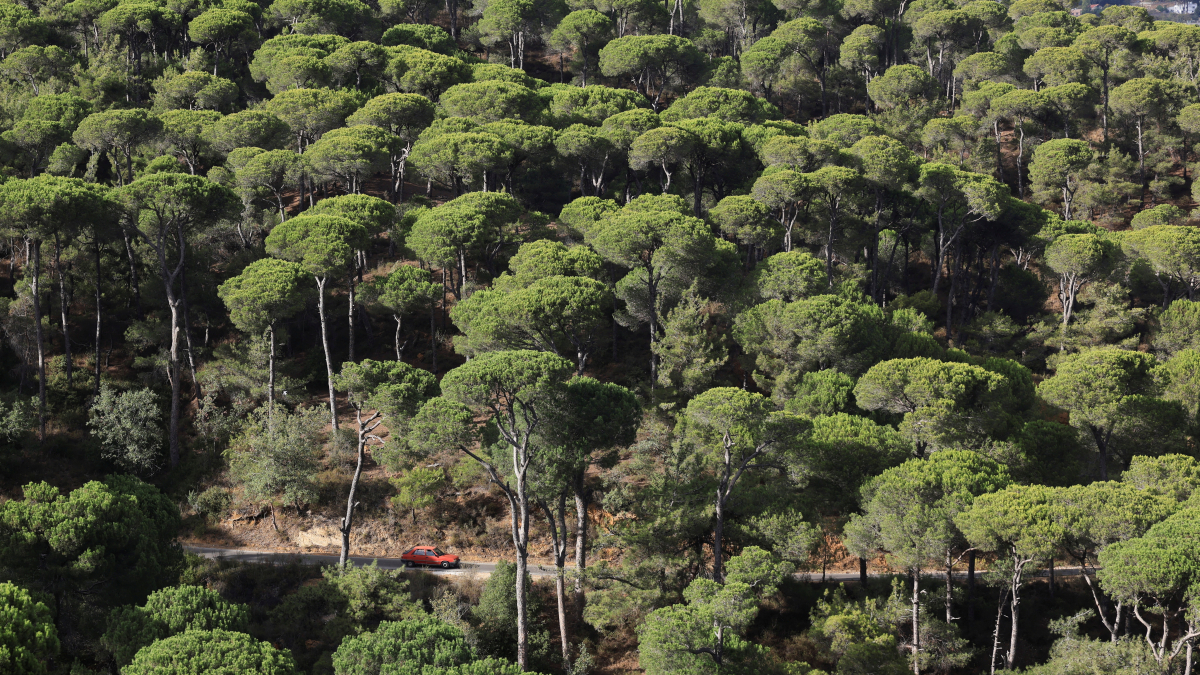Ukraine's Zelenskyy says ‘more readiness’ for next trilateral meeting, as Geneva talks conclude
U.S.-mediated talks on the Russia–Ukraine war concluded in Geneva on Thursday, with Ukrainian President Volodymyr Zelenskyy describing the outcome a...

In southern Lebanon’s Bkassine forest, once famous for its pine nuts, a silent crisis is stripping trees bare and leaving workers without livelihoods.
In the rolling hills of Bkassine, Lebanon’s largest productive pine forest, trees that once sustained entire communities now stand weakened and barren. The pine cones, which used to yield the country’s prized nuts, are increasingly empty. For farmers and harvesters, this has meant not only the loss of an ancient trade but also a way of life.
“We used to live very comfortably before,” said Miled Hareb, 62, a lifelong harvester from Bkassine. “I built a house from this pine business. But now it has been six or seven years and things are really, really bad. If we work, we eat, and if we don’t work, we don’t eat.”
At one time, hundreds of workers like Hareb and Syrian labourer Nabil Assad climbed the towering trees each season, collecting cones high above the forest floor. “There used to be more than 200 to 250 of us working,” Assad said. “Now we are less, barely 20 or 30. The cones aren’t good anymore, they are empty.”
At one time, hundreds of workers like Hareb and Syrian labourer Nabil Assad climbed the towering trees each season, collecting cones high above the forest floor. “There used to be more than 200 to 250 of us working,” Assad said. “Now we are less, barely 20 or 30. The cones aren’t good anymore, they are empty.”
Scientists have traced the collapse in productivity to an invasive insect, Leptoglossus occidentalis, originally from North America. Detected in Lebanon in 2015, it feeds on the seeds inside pine cones, hollowing them out over several years. “Under normal circumstances, only about 5% of seeds would be empty,” said Dr. Nabil Nemer, a forest health expert at the Holy Spirit University of Kaslik (USEK). “But with this insect, we’ve seen rates reach as high as 80 to 82%. That is catastrophic.”
Nemer’s team, working with experts from Europe and Türkiye, found that the insect spreads quickly in stressed ecosystems. Drought, erratic rainfall and rising temperatures linked to climate change have left Lebanon’s pine forests defenceless. “A healthy tree can fight back,” Nemer said. “But when it’s thirsty and starved, it has no defence.”
The consequences go beyond the forest. Bkassine once supported about 100,000 productive pine trees, according to the UN Development Programme. As yields fall, prices have soared. A kilogram of pine nuts now costs nearly $100, up from about $65 five years ago, making a staple of Lebanese cuisine unaffordable for many households and restaurants.
Illegal logging and neglect have compounded the damage. Forest management collapsed after Lebanon’s civil war, and the 2019 financial crisis worsened conditions further. Spraying pesticides requires army helicopters, and bureaucratic delays often mean the treatment arrives too late to stop infestations.
Lebanon’s agriculture ministry launched a national spraying campaign in August, but experts warn that fighting back requires more than chemicals. “The forest needs special treatment,” said agricultural engineer Issam Bou Rached. “We have to deal with it as an orchard, not just a wild forest. Awareness and organisation are key.”
In Bkassine, local harvesters are now being trained to spot infestations, report outbreaks and take part in restoration efforts, with support from USEK, the Ministry of Agriculture, the United Nations (UN) Environment Programme and the UN Food and Agriculture Organization.
Still, for families whose lives depend on the forest, recovery feels distant. Between insects, drought and economic hardship, Lebanon’s pine forests are losing their vitality—one cone at a time.
The death toll from heavy rains and flooding in Brazil’s Minas Gerais state has risen to 46, authorities said, with 21 people still reported missing. The storms triggered landslides and widespread flooding, displacing thousands across Juiz de Fora and Uba.
The U.S. Embassy in Jerusalem says it will provide on-site passport and consular services to settlers based in the West Bank on Friday 27 February. The move marks the first time American consular officials have offered such services to settlers, U.S. officials said on Tuesday.
UK police have concluded searches at Andrew Mountbatten-Windsor’s former residence in Windsor Great Park as part of an investigation into alleged misconduct in public office.
The situation in Cuba was heating up and called for restraint following a deadly incident involving a Florida-registered speedboat off the coast of the Caribbean island, the Kremlin said on Thursday (26 February).
A group of sick and injured Palestinians and their caregivers left Gaza through the Rafah border crossing on Wednesday (25 February) for medical treatment abroad, as limited evacuations continue under tight restrictions.
The death toll from heavy rains and flooding in Brazil’s Minas Gerais state has risen to 46, authorities said, with 21 people still reported missing. The storms triggered landslides and widespread flooding, displacing thousands across Juiz de Fora and Uba.
The administration of U.S. President Donald Trump on Thursday (12 February) announced the repeal of a scientific finding that greenhouse gas emissions endanger human health, and eliminated federal tailpipe emissions standards for cars and trucks.
Tropical Cyclone Gezani has killed at least 31 people and left four others missing after tearing through eastern Madagascar, the government said on Wednesday, with the island nation’s second-largest city bearing the brunt of the destruction.
Rivers and reservoirs across Spain and Portugal were on the verge of overflowing on Wednesday as a new weather front pounded the Iberian peninsula, compounding damage from last week's Storm Kristin.
Morocco has evacuated more than 100,000 people from four provinces after heavy rainfall triggered flash floods across several northern regions, the Interior Ministry said on Wednesday.
You can download the AnewZ application from Play Store and the App Store.

What is your opinion on this topic?
Leave the first comment